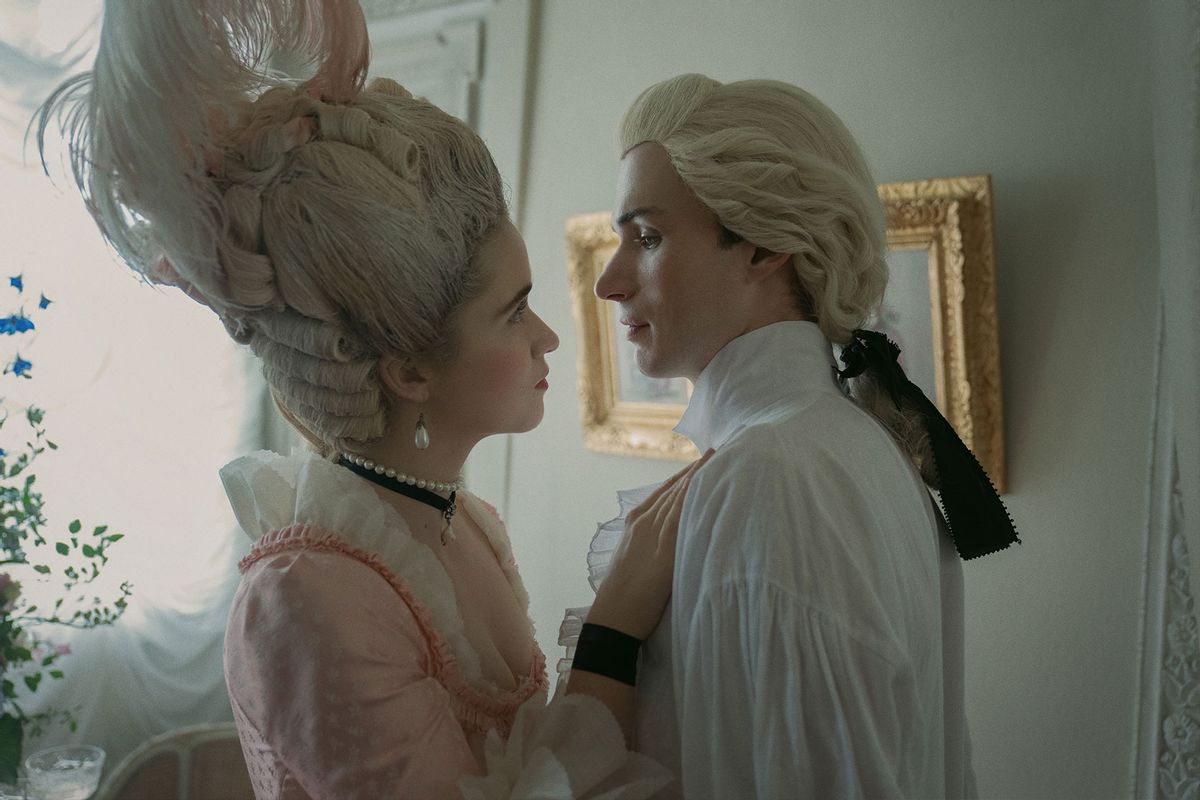"Les Liaisons Dangereuses" author Pierre Choderlos de Laclos' daring extended beyond the scandalous content contained within his 1782 novel. If its themes of vengeance, power, lust, duplicity and cruelty went too far, his aspirations for his novel's legacy reached further still.
Laclos' epistolary novel spins a web of decadent self-involvement and class warfare through the exchange of letters between the Marquise de Merteuil, a wealthy widow, and her former lover Vicomte de Valmont.
"I resolved to write a book that would be quite outside the ordinary trend," he's quoted as saying, "which would make a sensation and echo over the world after I left it." The career military officer succeeded at his mission in his time, but even more so in ours.
"Les Liaisons Dangereuses," better known as "Dangerous Liaisons," has inspired literary retellings, operas, ballets, stage productions, films and as of this month, a luscious eight-episode drama on Starz. Technically this rendition is a prequel that presents the origin stories of Marquise de Merteuil and Valmont before they had wealth, or in Valmont's case, a title with any coins behind it.
While not innocents by any means, the woman who began as Camille (Alice Englert) and her lover Valmont (Nicholas Denton) come to their grifting game as a matter of survival, although Camille soon realizes she'll have to rely on her wits and fast thinking to elevate her station and avenge her sex.
Like all versions of these characters, our anti-heroine and Valmont make a sport of manipulating others, and each other, competing to ruin the characters of those deemed challenging enough to ensnare.
Its setting in the years before the French Revolution has led some to view it as a critique of the aristocracy, which ignores what a sensation it was among the rich and influential in Laclos' time, some of whom were his patrons. Within a month of its publication, it sold a thousand copies and earned a fandom that included Marie Antoinette, who is said to have commissioned a copy for her private library.
Some view the story as a critique of the aristocracy, which ignores what a sensation it was in Laclos' time.
But if we mainly know "Dangerous Liaisons" through 20th-century interpretation, that probably has something to do with the novel having been banned for decades in the mid-19th century. Only in the early 20th century did it find champions in such notable authors as Aldous Huxley and Virginia Woolf.
It took a few more decades for it to be adapted to film in 1959 for the first time, and controversially, by Roger Vadim, who transplanted the characters to contemporary (by late 1950s standards) France, changed up the French aristocracy for the Parisian bourgeoisie, and plopped Jeanne Moreau and Gérard Philipe into the lead roles.
Although the film was a tremendous box-office success in France, Vadim's version did not turn out to be the standard for most modern pop culture interpretations.
That honor is ascribed to Christopher Hampton's 1985 London stage hit "Les Liaisons Dangereuses," which made it to Broadway in 1987 and starred Alan Rickman as the cunning Valmont. Oh, to have seen that!
Then again, John Malkovich famously, sexily killed the role in Stephen Frears' 1988 adaptation, with Glenn Close giving as good a performance or better as the Marquise alongside Michelle Pfeiffer as Valmont's prey Madame de Tourvel.
Milos Forman brought his spin to the tale in 1989's "Valmont," starring Colin Firth and Annette Bening, but Frears' worked from Hampton's script and expertly directed Malkovich and Close to capture their characters' intimate unknowability.
You can see echoes of their performances, along with Frears' highly stylized depiction of Parisian high society's opulence and the production's restrained humor, in nearly every worthwhile adaptation of Laclos' tale since.
In 1999's "Cruel Intentions" Sarah Michelle Gellar and Ryan Phillippe play the elegant, perilously bored fiends bent on sullying the reputations of Selma Blair and Reese Witherspoon, this time in Manhattan instead of Paris. It is in many respects the prelude to the original "Gossip Girl," right down to the prying, flying texts and blog posts taking the place of Laclos' flurry of letters.
This update is executed with style and aplomb that far exceeds 2022's "Dangerous Liaisons" – courtesy of French Netflix, where the action takes place in Biarritz and where power isn't measured in mere wealth but in the size of one's social media following. It's among the weakest contribution to the catalog, partiuclarly compared to 2003's "Untold Scandal," which translates the story into 18th century Korea seamlessly.
Want a daily wrap-up of all the news and commentary Salon has to offer? Subscribe to our morning newsletter, Crash Course.
What is it about Laclos' ruthless high-society predators that keeps us wanting to see more of them? Academics and fans have considered that question for ages. But from a TV or filmgoer's point of view, Valmont and the Marquise de Merteuil are fascinating diviners of human weakness and strategists on how best to exploit them.
What is it about Laclos' ruthless high-society predators that keeps us wanting to see more of them?
Hence, the appeal of the Marquise de Merteuil and Valmont is eternal. Separately and together, they are as seductive as they are contemptible, and experts at revealing only what they want the beholder to see.
They are the fictional forbears of Anna Delvey and every other libertine upper-class grifter one can conceive of. That they're also wealthy people held in high esteem in Parisian society makes them enviable. Who wouldn't want to be them and get away with their crimes against other people's good names and reputations?
What Starz's series is on the verge of figuring out is whether the audience desires to know how they became so fabulously merciless, and whether that will make people understand them better…or better value the mystery surrounding their motivations.
"Dangerous Liaisons" premieres at 8 p.m. Sunday, November 6 on Starz.



Shares